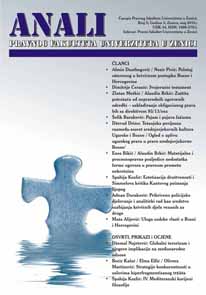Globalni terorizam i njegove implikacije na međunarodne odnose
Global Terrorism and Its Implications for International Relations
Author(s): Džemal NajetovićSubject(s): Politics / Political Sciences
Published by: Pravni fakultet - Univerzitet u Zenici
Keywords: Terrorism; future threats to stability; environmental threats to security; terrorist ideologies; “global terrorism“.
Summary/Abstract: The raise of individualism, the end of the Cold War, and the increasing role of non-state actors have caused international relations to transform into a much more complex system. This new system has created many communities which feel themselves to be victims. Such populations may abandon rational debate and retreat into „learned despair“, only communicating through violence. Regional conflicts have spread, and this has in turn been exploited by the hegemonic powers as they seek to consolidate their positions. Many more conflicts are likely to result from the growth in world population, climate change, energy and water shortages. In this context, terrorist groups are likely to base their ideologies on the two most enduring elements of popular identity: religion and ethnicity. This paper also analyzes the term „global terrorism“, and finds that what is called „global terrorism“ is no different from earlier terrorism.
Journal: Anali Pravnog fakulteta Univerziteta u Zenici
- Issue Year: 3/2010
- Issue No: 05
- Page Range: 215-227
- Page Count: 13
- Language: Bosnian

